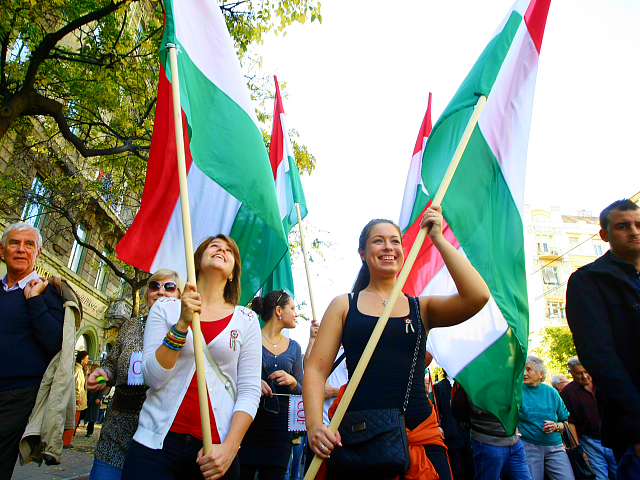Recent polls show that the conservative, anti-mass migration governing parties of Hungary and Poland are receiving record support as EU unity on immigration continues to crumble.
Nearly three-quarters of Polish voters, 73 per cent, believe President Andrzej Duda is performing well, according to a study by pollster CBOS.
In a separate survey conducted by IBRiS, Poland’s ruling Law and Justice Party (PiS) would pick up 47 per cent of the vote if parliamentary elections were held this week – way ahead of its rival, Civic Platform (PO).
The left-wing PO – the party of former Polish prime minister and current president of the European Council Donald Tusk – would get less than half as many votes (22 per cent).
The findings point to Poles feeling satisfied with the positions of its conservative leaders, who have been staunch opponents of the European Union’s mass-migration policies. The government has also reformed the country’s judiciary, to clear out remnants of Communism, in a move that Brussels alleges pose a threat to democracy.
In fellow Visegrád nation Hungary, the conservative-Christian alliance Fidesz/KDNP (Christian Democratic People’s Party ) reached an eight-year record high in a Tárki poll with 62 per cent of voters supporting Prime Minister Viktor Orbán’s government – more than four times the support for the next most popular party, the far-right Jobbik.
A similar poll by Századvég found Fidesz/KDNP was supported by 57 per cent of respondents (up five per cent).
Prime Minister Orbán, who is expected to win re-election on April 8th, has been a staunch supporter of preserving Christian Europe and opponent of the EU’s plan for the institutionalisation of managed mass-migration from the third world – plans which the Hungarian believes are informed by billionaire open borders campaigner George Soros.
Central Europe has been at the forefront of the resurgence of patriotic, self-determinism in mainland Europe, with the Czech Republic electing Eurosceptic Andrej Babiš as prime minister in October and reelecting anti-mass migration Miloš Zeman to the presidency in January, causing panic in Brussels as Zeman had offered Czechs a Brexit-style referendum on EU membership during the campaign.
In January, Balkan nation Croatia joined Austria, Hungary, Poland, the Czech Republic, and Slovakia in rejecting the EU’s migrant quotas and for standing up for a sovereign nation’s right to protect her borders and decide who enters.
Italy, which has bore the brunt of migrant sea arrivals from North Africa since the closure of the eastern Meditteranean route, is set to go to the polls in March with populist Five Star Movement in the lead in polls and the anti-mass migration League and Silvio Berlusconi’s Forza Italia in third and fourth places.

COMMENTS
Please let us know if you're having issues with commenting.